Ali Farka Touré | ||
| Allmusic Biography : One of the most internationally successful West African musicians of the 90s, Ali Farka Touré was described as "the African John Lee Hooker" so many times that it probably began to grate on both Tourés and Hookers nerves. There is a lot of truth to the comparison, however, and it isnt exactly an insult. The guitarist, who also played other instruments such as calabash and bongos, shared with Hooker (and similar American bluesmen like Lightnin Hopkins) a predilection for low-pitched vocals and midtempo, foot-stomping rhythms, often playing with minimal accompaniment. Tourés delivery was less abrasive than Hookers, and the general tone of his material somewhat sweeter. Widespread success on the order of Hooker was somewhat elusive, though, as Touré sang in several languages, and only occasionally in English. As he once told Option, his are songs "about education, work, love, and society." If he and Hooker sounded quite similar, its probably not by conscious design, but due to the fact that both drew inspiration from African rhythmic and musical traditions that extend back many generations. Touré was approaching the age of 50 when he came to the attention of the burgeoning world music community in the West via a self-titled album in the late 80s. In the following years he toured often in North America and Europe, and recorded frequently, sometimes with contributions from Taj Mahal and members of the Chieftains. In 1990, Touré retreated from music entirely to devote himself to his rice farm, but was convinced by his producer to again pick up the guitar to record 1994s Talking Timbuktu, on which he was joined by Ry Cooder. It was his most well-received effort to date, earning him a Grammy for Best World Music Album, but it was also proof that not all Third World-First World collaborations have to dilute their non-Western elements to achieve wide acceptance. However, Touré found success draining and again retreated to tend his farm. He didnt release a record on American shores for five more years; he finally broke the silence in 1999 with Niafunké, which discarded the collaborative approach in favor of a return to his musical roots. Then, once again, Touré stepped away from the limelight. In 2005, perhaps partly to keep his name familiar to music lovers, Nonesuch issued (for the first time on compact disc) Red & Green, two albums Touré recorded in the early 80s, packaged together as a two-disc set. In the Heart of the Moon was also released in 2005. Touré died on March 7, 2006, from the bone cancer that he had been battling for years; however, he was able to complete one last album before passing. His final album, Savane, was released posthumously in July 2006. It was later discovered that he had completed impromptu sessions a year before his death alongside Malian kora player Toumani Diabaté in London. The results of these sessions were released in the simply titled 2010 record Ali & Toumani. | ||
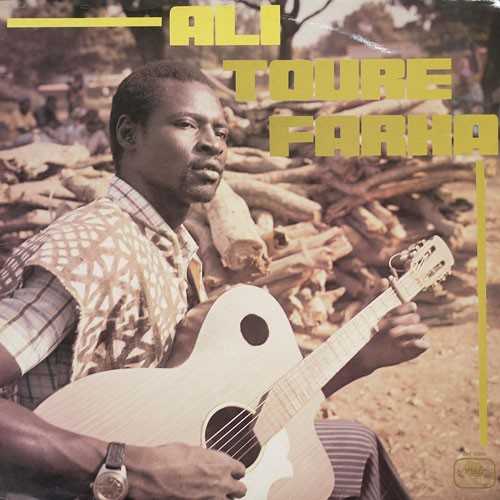 | Album: 1 of 12 Title: Ali Touré Farka Released: 1977 Tracks: 6 Duration: 27:03 Scroll: Up Down Top Bottom 25% 50% 75% AlbumCover | 1 Yer Sabou Yerkoy (04:40) 2 Yer Mali Gakoyoyo (04:48) 3 Yer Mali Woyo (04:10) 4 Assidou Dondoma (04:35) 5 Remobe (04:50) 6 Yermadine Tiere Kamba (04:00) |
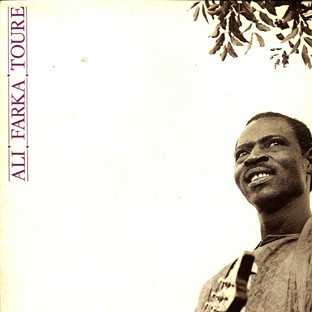 | Album: 2 of 12 Title: Ali Farka Touré Released: 1984 Tracks: 8 Duration: 43:37 Scroll: Up Down Top Bottom 25% 50% 75% Spotify TrackSamples AlbumCover | 1 La Drogue (05:36) 2 Ali Aoudy (06:33) 3 Chérie (04:39) 4 Timbindy (05:44) 5 Laleïché (05:31) 6 Ketiné (07:11) 7 Laisse les phases (04:38) 8 Baliky Lalo (03:42) |
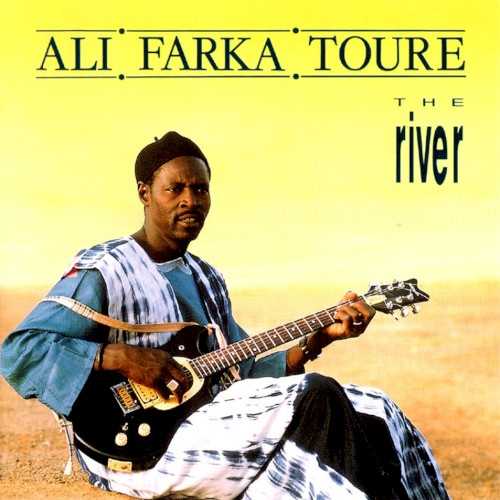 | Album: 3 of 12 Title: The River Released: 1990 Tracks: 11 Duration: 1:07:11 Scroll: Up Down Top Bottom 25% 50% 75% Spotify Wikipedia Allmusic AlbumCover | 1 Ai Bine (06:20) 2 Kenouna (05:02) 3 Toungere (07:31) 4 Heygana (05:55) 5 Jungou (07:23) 6 Goydiotodam (06:24) 7 Lobo (06:44) 8 Tamala (08:06) 9 Boyrei (05:22) 10 Tangambara (05:22) 11 Instrumental (02:57) |
| The River : Allmusic album Review : Toures second release expands his adventuresome blues-based approach, with a harmonica, sax, and native violin beefing up the sound on several cuts. | ||
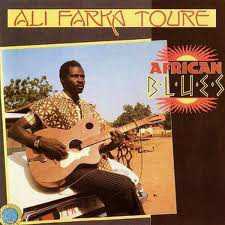 | Album: 4 of 12 Title: African Blues Released: 1990 Tracks: 8 Duration: 45:08 Scroll: Up Down Top Bottom 25% 50% 75% Wikipedia Allmusic AlbumCover | 1 Sidi Gouro (03:48) 2 N’timbara (04:00) 3 Devele Wague (06:01) 4 O Kata Gouna (04:24) 5 Zona (07:46) 6 M’baudy (08:53) 7 Petenere (04:51) 8 L’Exode (05:21) |
| African Blues : Allmusic album Review : Born in the Southern U.S., the blues contains elements that can be traced back to Africa. In the African country of Mali, the distinctive, unorthodox singer/guitarist Ali Farka Toure takes the process full circle by fusing the blues with elements of Malian folk on the heartfelt African Blues. With his acoustic guitar being the only instrument employed, Toure takes a minimalist, bare-bones approach that is closer to the rural Mississippi Delta blues of Robert Johnson, Charley Patton, and Son House than the electric Chicago blues of Howlin Wolf, Willie Dixon, and Little Walter. Simplicity serves Toure quite well on this fascinating album. | ||
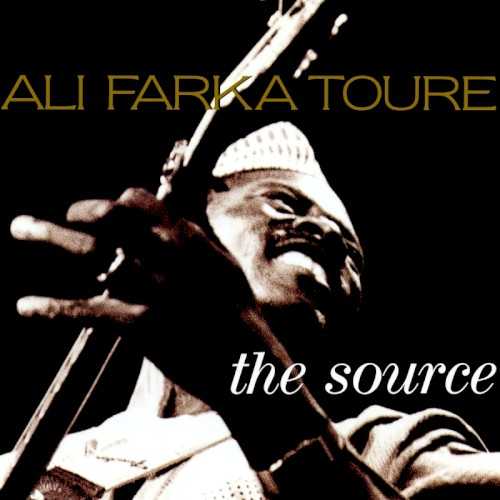 | Album: 5 of 12 Title: The Source Released: 1992-06-15 Tracks: 10 Duration: 1:00:31 Scroll: Up Down Top Bottom 25% 50% 75% Spotify Allmusic Wikipedia AlbumCover | 1 Goye Kur (06:24) 2 Inchana Massina (05:13) 3 Roucky (08:18) 4 Dofana (07:31) 5 Karaw (06:28) 6 Hawa Dolo (05:46) 7 Cinquante Six (05:31) 8 I Go Ka (03:59) 9 Yenna (05:54) 10 Mahini Me (05:23) |
| The Source : Allmusic album Review : African guitarist Ali Farka Toures previous releases were wonderful mixes of traditional language and rhythms being supported by contemporary concerns, instrumentalists, and producers. His most recent session features his working band backing Toure in a series of impassioned, animated tunes that are done in both his native tongue and English. The similarity between Toures sparse playing and percussive writing and early blues songs has been noted. What also deserves mention is the cohesive qualities his band have and the way his electric and acoustic playing, with its light, frilly air, fills in the spaces underneath his vocals easily. | ||
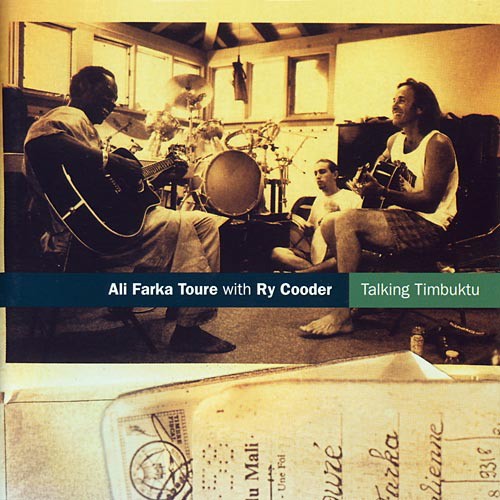 | Album: 6 of 12 Title: Talking Timbuktu Released: 1994-03-28 Tracks: 10 Duration: 1:00:03 Scroll: Up Down Top Bottom 25% 50% 75% Spotify Allmusic Wikipedia AlbumCover | 1 Bonde (05:28) 2 Soukora (06:04) 3 Gomni (07:00) 4 Sega (03:10) 5 Amandrai (09:22) 6 Lasidan (06:06) 7 Keito (05:42) 8 Banga (02:32) 9 Ai Du (07:08) 10 Diaraby (07:25) |
| Talking Timbuktu : Allmusic album Review : Guitarist Ali Farka Touré has repeatedly bridged the gap between traditional African and contemporary American vernacular music, and this release continues that tradition. Talking Timbuktu features him singing in 11 languages and playing acoustic and electric guitar, six-string banjo, njarka, and percussion, while teaming smartly with an all-star cast that includes superstar fusion bassist John Patitucci, session drummer Jim Keltner, longtime roots music great Ry Cooder (who doubled as producer), venerable guitarist Gatemouth Brown, and such African percussionists and musicians as Hamma Sankare on calabash and Oumar Touré on congas. | ||
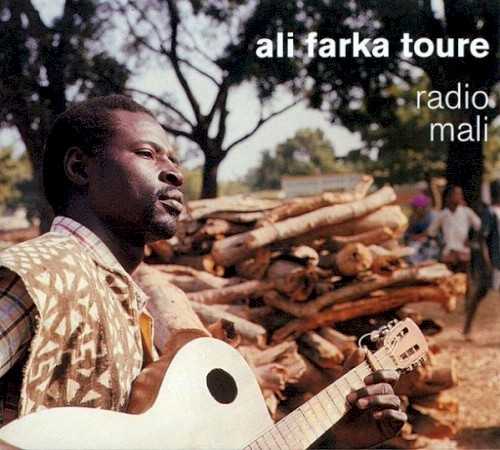 | Album: 7 of 12 Title: Radio Mali Released: 1996-04-22 Tracks: 16 Duration: 1:12:07 Scroll: Up Down Top Bottom 25% 50% 75% Spotify Allmusic Wikipedia AlbumCover | 1 Njarka (00:44) 2 Yer Mali Gakoyoyo (04:50) 3 Soko (05:08) 4 Bandalabourou (06:44) 5 Machengoidi (02:43) 6 Samarya (05:30) 7 Hani (04:21) 8 Gambari (06:26) 9 (njarka) Gambari (03:23) 10 Biennal (05:11) 11 Arsany (05:18) 12 Amadinin (07:10) 13 Seygalare (05:13) 14 Trei Kongo (05:27) 15 Radio Mali (02:46) 16 Njarka (excerpt) (01:03) |
| Radio Mali : Allmusic album Review : Ali Farka Toures Radio Mali features Malian radio appearances from 1970 to 1978, which were among the first performances to bring the West African guitarist/singers work to the attention of his countrymen. Though it was available for a time as an import CD, Rykodiscs release of Radio Mali marks its debut as a domestically available title. Tracks like "Njarka," "Samarya," and "Biennial" provide insight into Toures talent from before he was discovered by the world music community at large. | ||
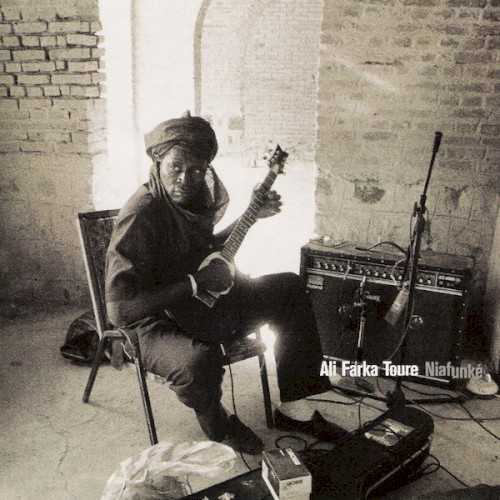 | Album: 8 of 12 Title: Niafunké Released: 1999-06-21 Tracks: 12 Duration: 51:31 Scroll: Up Down Top Bottom 25% 50% 75% Spotify Wikipedia Allmusic AlbumCover | 1 Alis Here (03:12) 2 Allah Uya (04:26) 3 Mali Dje (05:37) 4 Saukare (02:46) 5 Hilly Yoro (03:35) 6 Tulumba (05:17) 7 Instrumental (04:08) 8 ASCO (05:44) 9 Jangali Famata (03:18) 10 Howkouna (05:54) 11 Cousins (04:14) 12 Pieter Botha (03:14) |
| Niafunké : Allmusic album Review : Malian guitarist Ali Farka Toures music has always managed global travel with ease and musical grace, shrinking the miles between Western Africa and the Mississippi Delta and seemingly visiting every city in between. Toure has received his share of accolades for blurring the lines between his contemporary/traditional fingerpicking style and "country blues." Toure has routinely collaborated with musicians from other cultures and musical genres, most notably the prolific and internationally influenced Ry Cooder on their widely acclaimed 1994 album Talking Timbuktu. He establishes a firm aesthetic residence on Niafunké, his first and most welcome CD in five years. Niafunké was recorded using a state-of-the-art portable studio in Toures home village of Niafunke, which clearly lends a decisive authentic flavor and sense of musical place to the disc. Each tune is a lithe and resonant labyrinth of call-and-response patterns: a fingerpicked guitar speaks to a one-stringed njarka fiddle, calabash pummelings weave into those of the conga drums, and a lively small chorus answers Toures authoritative lead vocals. A couple of the best cuts include "Alis Here" and "Saukare." A beautifully rendered and intoxicating record. | ||
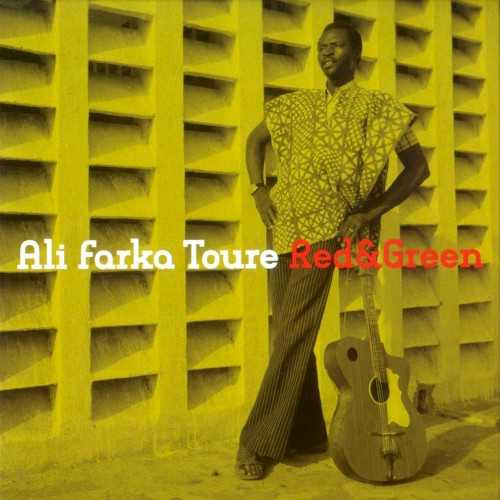 | Album: 9 of 12 Title: Red & Green Released: 2004 Tracks: 16 Duration: 1:28:45 Scroll: Up Down Top Bottom 25% 50% 75% Spotify Allmusic AlbumCover | 1 La Drogue (05:36) 2 Ali Aoudy (06:33) 3 Chérie (04:39) 4 Timbindy (05:44) 5 Laleïché (05:31) 6 Ketiné (07:11) 7 Laisse les phases (04:38) 8 Baliky Lalo (03:42) 1 Sidi Gouro (03:48) 2 O Kata Gouna (04:24) 3 Devele Wague (06:01) 4 N’timbara (04:00) 5 Zona (07:46) 6 M’baudy (08:53) 7 Petenere (04:51) 8 L’Exode (05:21) |
| Red & Green : Allmusic album Review : By the mid-90s, Malian guitarist Ali Farka Touré was expanding his signature acoustic African blues by changing his instrumental palette and collaborating with Western musicians like Ry Cooder (as on 1994s Talkin Timbuktu). While Touré gained prominence during this period, many die-hard fans tout the artists earliest work as his strongest. The double-disc set Red & Green brings together two albums originally released by the French label Sonodisc between the mid- and late 80s. The original vinyl versions were long out of print and difficult to find, until their issue here on Nonesuch. Both albums are entirely acoustic (Touré didnt introduce an electric guitar until 1991s The Source), with minimal accompaniment on calabash and ngoni (a traditional four-string guitar), which perfectly complements Tourés percussive guitar style and plaintive, keening vocals. The music bears a striking resemblance to the modal blues of American artists like Son House and John Lee Hooker, yet it is deeply West African, with scales and motivic flourishes indigenous to the culture, and lyrical themes that reflect Tourés life in rural Mali. Red & Green is a must for Touré fans: a blissful, early dose of this singular artists superb music. | ||
 | Album: 10 of 12 Title: In the Heart of the Moon Released: 2005-06-27 Tracks: 12 Duration: 54:39 Scroll: Up Down Top Bottom 25% 50% 75% Spotify Allmusic AlbumCover | 1 Debe (04:55) 2 Kala (05:06) 3 Mamadou Boutiquier (05:04) 4 Monsieur le Maire de Niafunké (03:58) 5 Kaira (06:24) 6 Simbo (04:00) 7 Ai Ga Bani (04:34) 8 Soumbou Ya Ya (03:30) 9 Naweye Toro (04:23) 10 Kadi Kadi (03:21) 11 Gomni (04:17) 12 Hawa Dolo (05:00) |
| In the Heart of the Moon : Allmusic album Review : In the Heart of the Moon is a duet recording by Malian guitar slinger Ali Farka Toure and Mandé lineage griot Toumani Diabate on kora. There are a few other players who contribute percussion here and there, and Ry Cooder plays a Kawai piano on a couple of tracks and a Ripley guitar on one, but other than these cats, this is a live duo set without edits or enhancements of any kind. There were three sessions in the conference room of the Mande Hotel in Mali, the first of which was on the eve of Farka Toure being elected mayor of his town, Niafunké. Most of the music here dates back to the Jurana Kura (translated as new era) cultural movement, which was part of the independence struggle in the 1950s and early 60s. The music created by the Jurana Kura for the guitar created a entirely new style of rhythmic fingerpicking. For those familiar with Farka Toures blazing lead style, this disc may come as a shock. While he does solo many times here, he is also playing in balance with Diabate, whose kora has the larger lyric and harmonic palette, so he is in a supporting role. It doesnt matter. Whether the song is "Kaira" (written and performed by Diabates father in the 50s and the earliest recorded track on the album, from before the Mande sessions), "Ai Ga Bani (I Love You)" and "Soumbou Ya Ya" (both written for young people during the Jurana Kura), or one of Farka Toures originals near the end of the set, such as "Gomni," the style is the same. Everything echoes this earlier era because it has informed all Malian and Guinean music since. The purpose was to make people aware not only of its existence but to inspire and exhort. The music is insistent but not strident. It contains a gentleness and tenderness that seem to drip from the region, one of the poorest in the world. The players focus and intensity are captured, but they make it all come off so easily that the listener gets lost in the pleasure of these gorgeous melodies and the call-and-response style of interaction between the players. Simply put, In the Heart of the Moon is nothing short of remarkable, and one of the best offerings World Circuit/Nonesuch have ever released. | ||
 | Album: 11 of 12 Title: Savane Released: 2006-07-17 Tracks: 13 Duration: 58:42 Scroll: Up Down Top Bottom 25% 50% 75% Spotify Allmusic Wikipedia AlbumCover | 1 Erdi (04:42) 2 Yer Bounda Fara (04:18) 3 Beto (04:49) 4 Savane (07:43) 5 Soya (04:38) 6 Penda Yoro (05:24) 7 Machengoidi (03:35) 8 Ledi Coumbe (03:16) 9 Hanana (02:34) 10 Soko Yhinka (05:05) 11 Gambari Didi (03:49) 12 Banga (03:48) 13 NJarou (04:55) |
| Savane : Allmusic album Review : Before his death in 2006, Malian guitarist Ali Farka Toure recorded some sessions in the Hotel Mande in Bamako, Mali. SAVANE, released posthumously, is taken from those sessions, and it bears testament to Farka Toures standing as one of the giants of contemporary African music. The hallmarks of the artists work are all here: gentle, mesmerizing tunes centered on sinuous, circular guitar patterns, and evocative vocal lines that float above the music and work in dialogue with the percussion. A valuable addition to Farka Toures catalogue, SAVANE is a beautiful, elegant swan song that belongs alongside the artists best work. | ||
 | Album: 12 of 12 Title: Ali and Toumani Released: 2010-02-22 Tracks: 13 Duration: 50:23 Scroll: Up Down Top Bottom 25% 50% 75% Spotify AlbumCover | 1 Ruby (05:55) 2 Sabu Yerkoy (04:08) 3 Be Mankan (05:06) 4 Doudou (04:47) 5 Warbé (04:51) 6 Kenouna (?) 1 Samba Geladio (03:17) 2 Sina Mory (04:28) 3 56 (06:57) 4 Fantasy (02:18) 5 Machengoidi (05:05) 6 Kana Kassy (?) 7 Kala Djula (03:27) |